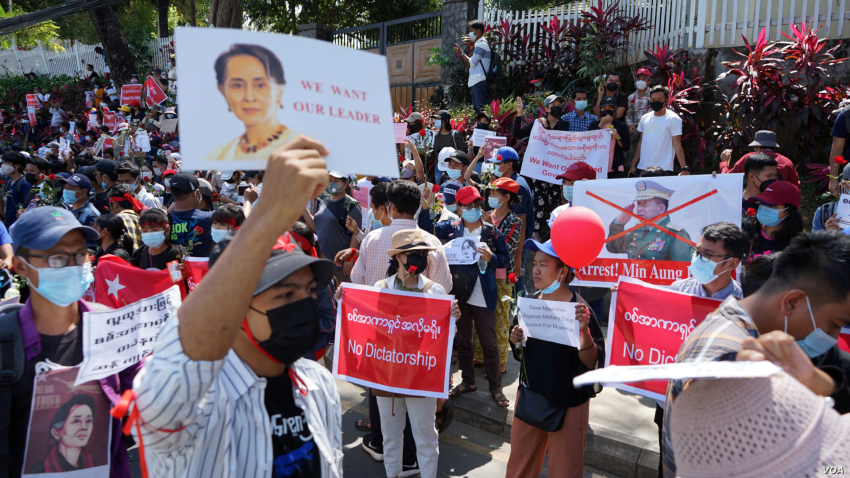
Three years after the February 2021 coup in Myanmar, the Australian Labor government is facing renewed criticism for its failure to impose meaningful sanctions on the illegitimate military junta. Since the coup, 2.7 million people have been internally displaced, 78,737 civilian houses have been destroyed, more than 20,000 civilians detained and 4572 lives lost.
While Australia’s allies — the United States, the European Union, Britain and Canada — have imposed regular rounds of sanctions on the junta and its source of funds, Australia’s lack of action has enabled them a reliable flow of income. Sanctions introduced by Labor last year have been criticised as more of an exercise in election box-ticking than real commitment.
Unlike the US, Britain, Canada, the EU and New Zealand, Australia has not imposed sanctions on the cabinet members of the junta. Moreover, representatives of Myanmar’s military junta attended the Special Summit events between Australia and the Association of Southeast Asian Nations (ASEAN) in Melbourne from March 4‒6. All indications are that they will also attend the 35th ASEAN-Australia forum in Laos from March 16‒17.
'Basic measures'
Susannah Patton, Southeast Asia Program director at the Lowy Institute, has characterised Australia’s sanctions as "the most basic possible measures".
Some of the sanctions implemented by Australia in February last year were purportedly aimed at tackling members of the State Administration Council of Myanmar (SAC). However, five individuals listed under SAC sanctions were no longer members of the SAC, and 11 SAC members, including key figures like Lieutenant-General Yar Pyae and Wanna Maung Lwin, were conspicuously absent from the list.
Fresh sanctions in February 2024, aimed at restricting the regime's access to funds and equipment facilitating human rights atrocities, lacked any updates to the SAC member list.
The central recommendation of the UN Independent International Fact-Finding Mission was for the economic isolation of and disengagement from military linked companies and state-owned enterprises. Australia is an outlier in not having sanctioned any of the key State Owned Enterprises and banks now under full control of the military junta.
In opposition Labor committed to seek “strong and enduring relations with the people of Myanmar”, and in government it pledged to impose “targeted sanctions against human rights abusers in Myanmar”.
Penny Wong, as opposition foreign affairs spokesperson, said Australia “cannot be a bystander to a direct attack on Myanmar’s democracy”. However, despite promises, pledges and expectations, Labor has done little to stop Australian mining companies operating hand in glove with the military junta.
Compounding Labor’s lack of action in sanctioning the junta is its unwillingness to protect those fleeing the violence and repression.
According to information obtained via a Freedom of Information request, from February 1, 2021, to January 6, 2024, the Australian government granted 1344 Refugee and Humanitarian Visas. However, 3145 individuals were refused. Currently, 9853 individual applications remain under review. By comparison, Australia granted 12,871 Offshore Refugee and Humanitarian visas to Afghani nationals between February 11, 2022 and July 2023.
Mining and resources fund junta
For the military junta, the exploitation of natural resources is its biggest source of foreign revenue — and funds from mining, which make up a highly lucrative part of that trade, flow directly to them through revenue sharing, rent and tax.
Critics say vested interests have led the Australian government to turn a blind eye to the involvement of Australian executives, investors and companies in Myanmar’s mining sector.
Mines Against Humanity, a recent report by the NGO Justice for Myanmar, reveals how companies led and managed by Australians conduct mineral exploration and extraction as well as services critical to the mining sector under the military junta, including testing, drilling, assessment, consulting and other technical services. Importantly, the report exposes Australia’s outsized footprint in Myanmar’s mining sector, one which has endured three years of military rule and sits in stark contrast to its Western allies.
According to Myanmar Campaign Network, since the coup, Australia has also imported $2.5 million worth of timber and wood products, $508,000 worth of pearls and gems and $46,000 worth of arms and ammunition from entities linked directly to the junta-controlled state-owned enterprise.
Mon Zin, a founding member of the Global Myanmar Spring Revolution, told Green Left in 2023 that these imports “help fund the junta’s war against the people of Myanmar”.
The junta’s war is inextricable from its mining activities, not only because of revenue flow “but because the junta’s attempts to wrestle control of the mine sites have fuelled localised violence, human rights abuses and environmental destruction”.
Brutal and illegitimate
The Myanmar military continues to be characterised by brutality and illegitimacy. The UN Special Rapporteur on the human rights situation has unequivocally stated the military’s attempted “coup was illegal and its claim as Myanmar’s government is illegitimate”.
Australian Greens senator, Jordon Steele-John, at a foreign affairs committee hearing in February, asked whether the government’s diplomats had raised concerns with their ASEAN counterparts about the likely presence of junta officials in Laos, on March 16-17.
Steele-John highlighted the inconsistencies between Australia’s stance on the junta’s illegitimacy and co-hosting a meeting attended by junta officials.
He told Myanmar Now: “As co-host, Australia should insist that the representative of the Myanmar military junta is not allowed to attend the meeting and has their invitation to attend the forum revoked. Instead, that invitation should be offered to the National Unity Government, Myanmar’s only legitimate, representative government”.
While Labor fails to meaningfully act, the Greens are pushing for a change in the government’s stance. In addition to recognising the NUG as the legitimate democratic government of Myanmar, the Greens’ policy calls for targeted sanctions on organisations involved in the financial support of the junta, diplomatic isolation of the junta and an increase in humanitarian aid.